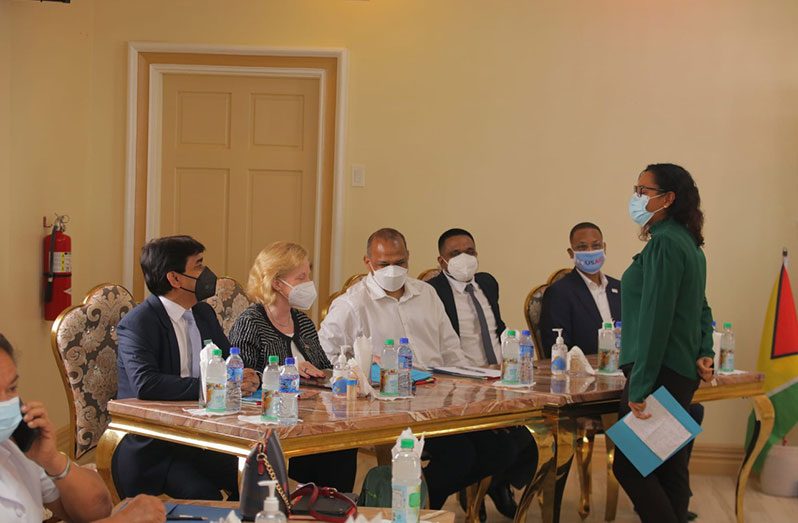-says Health Minister
WITH the vaccination rates in Region Two (Pomeroon-Supenaam) remaining stagnant due to vaccine hesitancy, Minister of Health Dr. Frank Anthony noted on Monday that the best tool to combat this issue is the debunking of misinformation and widespread public health education.
He made this comment during the opening ceremony for the USAID-funded three-day COVID-19 vaccine hesitancy workshop, held at the Jaigobin Hotel, Anna Regina, on the Essequibo Coast.
The exercise aims to equip the region’s health professionals and religious and community leaders with COVID-19 statistics and information that they can use to educate residents about the importance of the vaccine. It is hoped that this transfer of knowledge will decrease the hesitancy and push residents toward becoming vaccinated.
Since the government started rolling out its COVID-19 vaccination programme in February 2021, vaccine rates which at one time were the highest in Region Two, saw a sudden drop. Some 67.9 per cent of the adults received their first dose and just 53 per cent went on to become fully vaccinated, that is, they took the second dose of the vaccine they chose.
Both figures, according to Minister Anthony, are below the country’s national vaccination average, which currently stands at 85 per cent.
The health minister used the opportunity to urge everyone to take vaccination seriously, noting that the COVID-19 vaccines have played a major part in preserving the lives of persons who contracted the deadly virus.
He added that while there is no cure for the virus, statistics has shown that vaccinated persons accounted for the higher percentage of total recoveries.
He noted that while there is easy access to scientifically sound findings on the benefits of the COVID-19 vaccines, misinformation remains one of the biggest deterrents to its acceptance in Guyana.

WE NEED YOUR HELP
Calling on religious and community leaders to use their platforms to get the message out, Minister Anthony noted that joint collaboration with government is needed to protect the citizens of the region.
He called on the leaders to step up and share accurate information on the vaccine, emphasising that they must not leave communities vulnerable to the virus.
“If you don’t know, then say you don’t know. If you would like to have more information, then ask for more information; we don’t know everything and if I don’t know anything then I must be able to find out from someone who is an expert…Similarly, if you don’t know then ask some of the technical people and they would be able to help, so you could now have the information and the knowledge to pass on to the people that are coming to you,” Minister Anthony noted.
Meanwhile, U.S. Ambassador to Guyana, Sarah Ann Lynch echoed Minister Anthony’s calls for increased vaccination.
She noted that the only way to protect each other and return to a pre-COVID-19 state is for everyone to be vaccinated, which will ensure that they have a high level of protection.
“We are not safe until all of us are safe,” the U.S. Ambassador stated, before adding that the United States remains committed to sharing resources with Guyana to ensure the vaccination and protection of its citizens.
Since the pandemic first hit, the United States has donated significantly to Guyana’s fight against COVID-19. In August 2021, the U.S. donated 146,250 doses of the Pfizer vaccine. In October 2021, an additional 100,620 doses of the vaccine were handed over.
Guyana’s vaccine-storage capacity was also boosted with the United States’ donation of five ultra-cold temperature vaccine storage freezers, worth US$72,000 (or GY $14 million).


.jpg)











